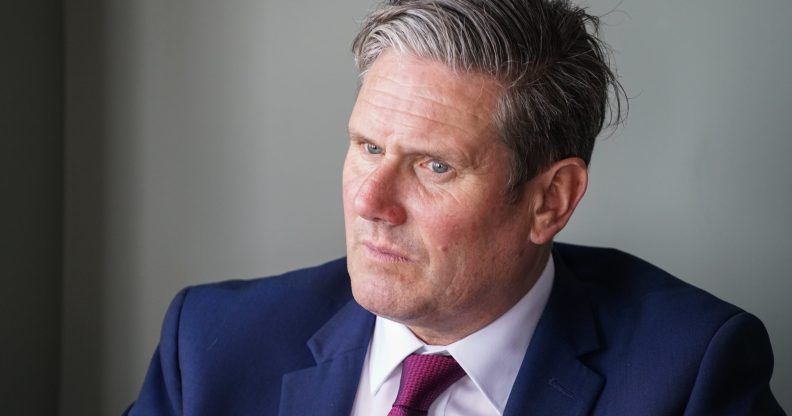Unless Labour chooses to fight against transphobia now, Keir Starmer risks losing hard-won LGBT+ votes

Keir Starmer. (Hugh Hastings/Getty)
Proud socialist and chair of the Labour Campaign for Trans Rights, Torr Robinson explains for PinkNews why Keir Starmer and the Labour Party needs to rise up and fight transphobia now, or risk being on the wrong side of history.
Last weekend, Rosie Duffield became just the latest Labour MP to be accused of expressing transphobic views.
Duffield stated that “only women have a cervix”, complaining about the use of inclusive language in an article about cervical cancer screening. After a period of silence, she doubled down by sharing an article that included claims about the superiority of “biological reality” over “feelings”, and then insulted transgender campaigners in Labour, calling us “petulant youngsters”.
What Rosie Duffield said was deeply harmful. It erases the existence of trans men and many non-binary people, and undermines accurate public health information.
Yet this incident could have been resolved quickly. She could have been asked to retract by the Labour leadership or her fellow MPs. A meeting could have been set with trans people to discuss it, and a statement of apology published. If she refused, the party could have stood by its own rules prohibiting prejudice against trans people and removed the whip.
But none of this has happened. Instead, Labour MPs lined up to defend her. Former Labour leadership contender Jess Phillips took to the radio to defend Duffield, and shadow ministers Rachel Reeves and Wes Streeting gave their public support. Even Labour’s shadow minister for women and equalities, Marsha de Cordova, liked a tweet backing Duffield. There are no signs that any attempt has been made to rebuke her by MPs or the Labour leadership.
Clearly, Duffield is no lone representative of anti-trans sentiment in Labour. Transphobia is seemingly accepted, even supported by many of the party’s senior politicians. Nor is this the first incident to make that apparent. MPs like Phillips have previously supported the demands of anti-trans groups, and former shadow chancellor John McDonnell met with these organisations.
In 2019, the party watered down its commitment to Gender Recognition Act reform with a promise to “protect single-sex spaces”, and since Keir Starmer became leader it has shrunk even further from supporting trans people. Keir Starmer was the only leadership candidate not to sign the Labour Campaign for Trans Rights pledges, drawn up by trans members seeking to change the party for the better.
The trans community needed our allies to stand up vocally against these plans, but all that emerged from Starmer’s Labour were mild assurances of “scrutiny”.
Yet it was still a surprise when, after leaks emerged in June showing that the Tories had extensive plans to roll back trans rights, an eerie silence descended upon Keir Starmer and his front bench. These proposals would be the greatest attack on LGBT+ rights since the infamous Section 28, which banned the “promotion of homosexuality” in schools. The trans community needed our allies to stand up vocally against these plans, but all that emerged from Starmer’s Labour were mild assurances of “scrutiny“.
Throughout these events, I have heard from trans members that they can no longer stay in this party, a party that they feel does not care about us and our community. At first, it was just a slow trickle; now, it is becoming a flood.
The number of trans people in Labour may be small, but those members who have left are irreplaceable losses to the party. They are tireless organisers and campaigners, passionate believers in a better world with a burning need to create it. They were assets to the movement, who have been left betrayed and embittered. They dedicated their energy to Labour only to be repeatedly abandoned, and in the case of Duffield, denigrated.
Allies, both in and out of the LGBT+ community, are also losing patience with transphobia in the Labour Party. Yet the leadership appears unconcerned with this. Perhaps they believe, as many analysts in our transphobic media do, that supporting trans people risks alienating “traditional” voters. Where have we heard that before?
Allies, both in and out of the LGBT+ community, are losing patience with transphobia in the Labour Party. Yet the leadership appears unconcerned with this.
In the 1980s, senior Labour figures were concerned that “the gay and lesbian issue” would cost them votes. Labour politicians take it as a given now that Labour must be the political home of LGBT+ people, but it was not so long ago that a Labour leader called a gay candidate a “fairy“.
It took decades of hard work to build a relationship between our community and Labour, work achieved by LGBT+ people alongside other oppressed communities. When support for our rights first entered party policy, it was through a motion backed by the miner’s union following LGBT+ support during the miner’s strike, and against the opposition of the ruling National Executive Committee.
Now, all parties claim they support LGBT+ people. After years of organising, we changed the country; the Tories, embarrassed by their past, had to apologise for Section 28. Labour now claims it will “always stand with us“. But history shows that was not always the case, and unless Labour fights against transphobia today, it risks throwing away that hard-won alliance.
As a proud socialist and Labour member, I find this prospect deeply saddening. But I and other trans people will not wait until the party finds it convenient to fight for our rights. Either Labour can choose transphobia now, and eventually be sunk by the tide of history, or it can rise with us. I hope it learns the lessons of the past and chooses wisely.

